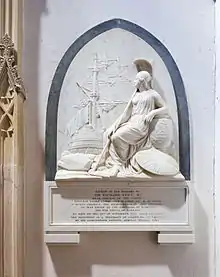Richard Spry
Admiral Sir Richard Spry (1715[1]– 25 November 1775[2]) was a Royal Navy officer who served as Commander-in-Chief, North American Station.
Sir Richard Spry | |
|---|---|
| Born | 1715 |
| Died | 25 November 1775 Place House, Cornwall |
| Allegiance | |
| Service/ | |
| Rank | Admiral |
| Commands held | North American Station Mediterranean Fleet Plymouth Command |
| Battles/wars | War of the Austrian Succession Seven Years' War |
Naval career
After an education at Truro Grammar School[3] Spry joined the Royal Navy as a volunteer in 1733.[4] Following the sinking of his ship by the Spanish Navy he was taken prisoner in 1745 but released two months later.[4]
He took part in the siege of Pondicherry in India in 1750.[4]
From 17 October 1753 to 5 June 1754 he was captain of the frigate HMS Garland.[5]
In 1755 he became senior officer at Halifax, Nova Scotia,[4] and in 1758 took part in the successful Siege of Louisbourg.[4] He was given command of HMS Orford in 1760.[4] In 1762 he was appointed Commander-in-Chief, North American Station.[4] In 1766 he was promoted to the rank of Commodore and appointed Commander-in-Chief, Mediterranean Station.[4][6]

Spry returned to England in 1769.[4] In 1770 he was promoted to rear admiral and went on to be Port Admiral at Plymouth[6][7] in 1771.[8]
Spry was knighted at Portsmouth on 24 June 1773 and retired to Place House in St Anthony in Roseland, Cornwall.[9] He died there in 1775.[4][6] His memorial in St Anthony's Church there is by Humphrey Hopper.[10]
References
- . Dictionary of National Biography. London: Smith, Elder & Co. 1885–1900.
- File:Memorials to the Spry family in St Anthony's church, St Anthony in Roseland-8952.jpg
- Richard Polwhele, The History of Cornwall, Civil, Military, Religious, Architectural, Agricultural, Commercial, Biographical, and Miscellaneous, vols. 4-7 (Michel & Co., 1816), p. 66
- Richard Spry at Oxford Dictionary of National Biography
- "Richard Spry". Three Decks. Retrieved 8 October 2020.
- Hardy 1783, p. 56
- A genealogical and heraldic history of the commoners of Great Britain, Volume 4, p. 695
- "Vice-Admiral William Bligh". The Peerage. 20 April 2009.
- Cornwall: Walking along the Roseland peninsula Daily Telegraph, 12 August 2000
- Gunnis, Rupert (1953). Dictionary of British Sculptors 1660-1851. Odhams.
Bibliography
- Hardy, John (1783). A Chronological List of the Captains of His Majesty's Royal Navy (PDF). London: T. Cadell. OCLC 8908960.
| Military offices | ||
|---|---|---|
| Preceded by Sir George Edgcumbe |
Commander-in-Chief, Plymouth 1771–1775 |
Succeeded by John Amherst |